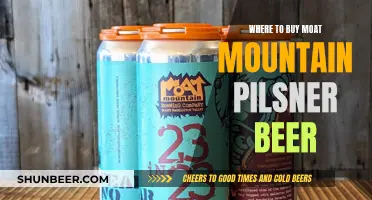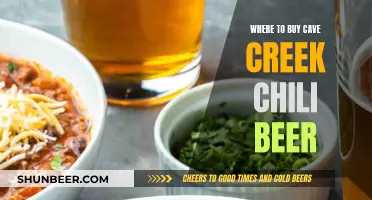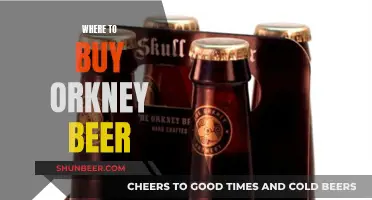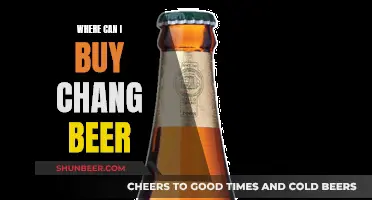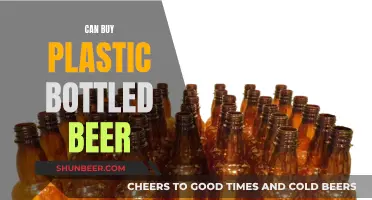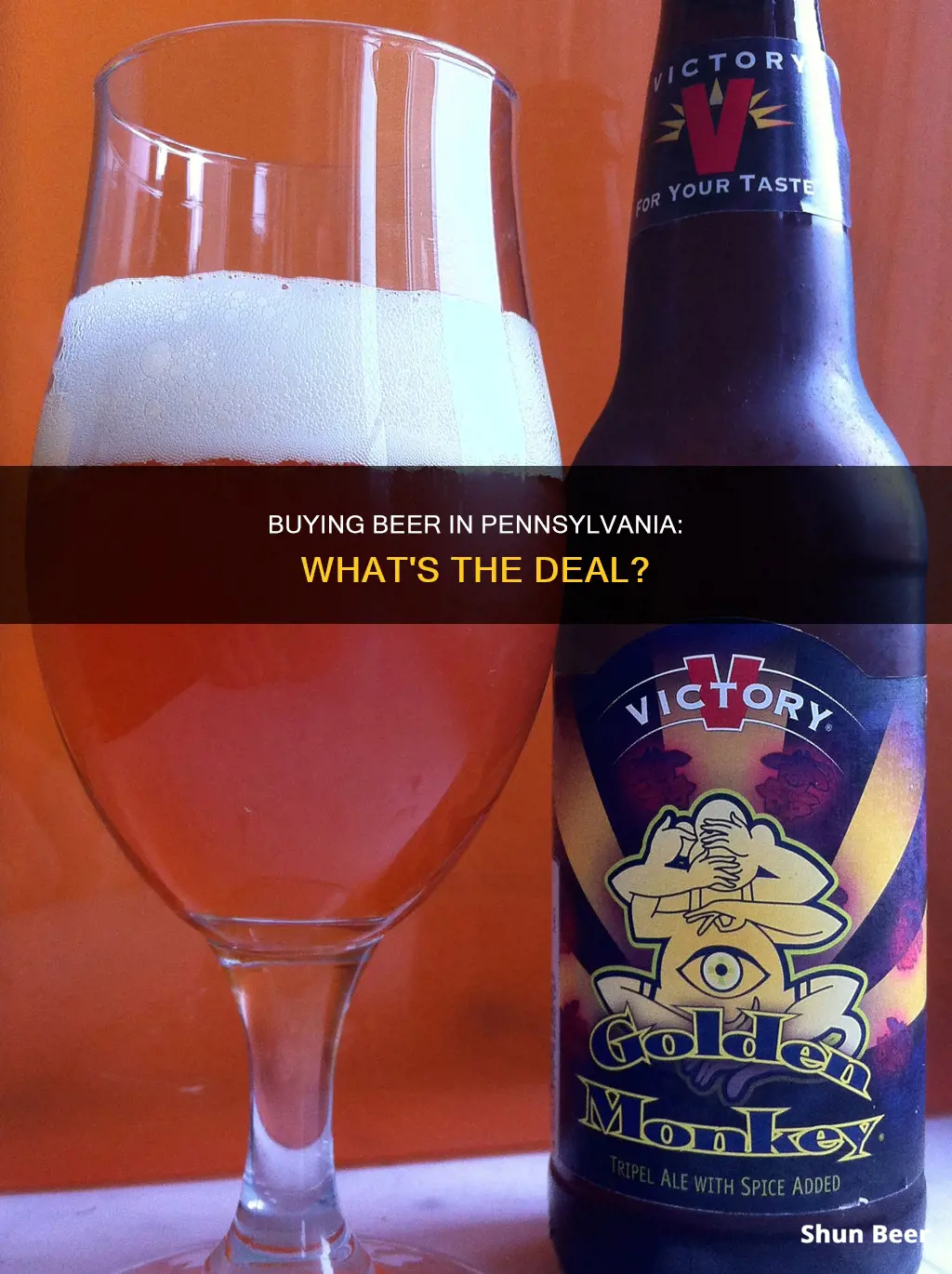
Pennsylvania's liquor laws are notoriously confusing, restrictive, and frustrating. The state's complicated alcohol laws can be traced back to the Prohibition era and Governor Gifford Pinchot, who was a teetotaler. Pinchot established the Pennsylvania Liquor Control Board to discourage the purchase of alcoholic beverages by making it as inconvenient and expensive as possible. So, can you buy beer in Pennsylvania? The answer is yes, but it's not as simple as popping into your nearest convenience store or gas station. Beer can be purchased from distributors, bottle shops, bars, grocery stores, and breweries, but the amount they can sell you varies depending on their license type. Some establishments may only sell beer in larger quantities, like cases and kegs, while others can sell single bottles or six-packs. Pennsylvania's liquor laws have recently been relaxed, but buying beer still involves navigating a maze of rules and restrictions that differ from those in most other states.
| Characteristics | Values |
|---|---|
| Beer purchase restrictions | Beer can be purchased from distributors, bottle shops, bars, grocery stores, and breweries. Distributors have the fewest restrictions, selling kegs, cases, 12-packs, 6-packs, single bottles, and growlers. Other licensed retailers can sell up to 192 fluid ounces (12 16-ounce cans) per transaction, requiring separate transactions for additional purchases. |
| Beer consumption location | Beer purchased from distributors is for "off-premise consumption." Beer bought from bottle shops, grocery and convenience stores, bars, and breweries can be consumed on-site or off-site. |
| Beer delivery | Beer can be delivered or shipped to homes or businesses by breweries, services like GoPuff or Quick Sip Delivery, and out-of-state shipping services. |
| Liquor sales | Liquor is sold at state-owned Fine Wine & Good Spirits stores and Pennsylvania distilleries. |
| Liquor consumption location | Liquor purchased from state stores is for off-site consumption. Liquor from distilleries can be consumed on-site or off-site. |
| Liquor delivery | Liquor can be shipped or delivered to homes or businesses by state stores and distilleries, but not by out-of-state distilleries or retailers. |
| Wine sales | Wine is available at bottle shops, grocery stores, state stores, and wineries. |
| Wine consumption location | Wine can be consumed on-site or off-site. |
| Wine delivery | Wine can be shipped to addresses in Pennsylvania by state stores and wineries. Local delivery options are also available. |
| Minimum drinking age | 21 years |
What You'll Learn

Beer distributors vs. grocery stores
Pennsylvania's liquor laws are notoriously complex and restrictive, a legacy of the Prohibition era and the "dry" stance of Gifford Pinchot, the state's governor from 1923 to 1935. Pinchot established the Pennsylvania Liquor Control Board to license establishments, set serving hours, and regulate prices.
When it comes to buying beer in Pennsylvania, there are two main options: beer distributors and grocery stores. Here's a detailed comparison between the two:
Beer Distributors:
Beer distributors are dedicated establishments licensed to sell larger quantities of beer, typically cases and kegs. They have the fewest restrictions on the amount of beer they can sell. You can purchase kegs, cases, 12-packs, 6-packs, single bottles, and growlers from beer distributors. However, all beer purchased from distributors is for "off-premise consumption," meaning you can't drink it on-site. Beer distributors typically have similar operating hours as Wine and Spirits stores, and they may require a special license to sell beer on Sundays, with sales before 9 am prohibited.
Grocery Stores:
Grocery stores in Pennsylvania can obtain a license to sell beer, but they have quantity restrictions. Specifically, they can sell up to 192 fluid ounces of beer per transaction, equivalent to 12 16-ounce cans. If you want to buy more, you'll need to make multiple transactions or visits. On the plus side, grocery stores can sell beer for "on-premise consumption," so you have the option to drink it there or take it to go.
Other Options:
It's worth mentioning that besides beer distributors and grocery stores, there are other options for purchasing beer in Pennsylvania. These include bottle shops, bars, convenience stores, and breweries, each with their own license restrictions and allowances. Additionally, you can have beer shipped or delivered to your home from breweries or online beer delivery services.
In summary, the main difference between beer distributors and grocery stores in Pennsylvania lies in the quantity of beer they can sell and the allowance for on-premise consumption. Distributors offer more variety and larger quantities, while grocery stores provide the convenience of buying beer alongside your groceries, with the option to drink it on-site.
Black Label Beer: Where to Buy Carling's Signature Brew
You may want to see also

On-premises vs. off-premises consumption
Pennsylvania's liquor laws have been described as "frustrating and restrictive", with some of the most ""backward" liquor laws in the country. The state's complex alcohol laws can be traced back to the Prohibition era and the end of Governor Gifford Pinchot's tenure, a teetotaler who maintained a tough stance on alcohol control.
The Pennsylvania Liquor Control Board (PLCB) was created to license establishments, set serving hours, and regulate prices. The PLCB operates on a quota system, with one license for every 3,000 county inhabitants. There are several types of liquor licenses available, including retail licenses, which are further divided into liquor licenses and dispenser licenses.
Retail liquor licenses allow for the on-premises sale and consumption of alcoholic beverages, including liquor, wine, malt, and brewed beverages. On the other hand, retail dispenser licenses are limited to the sale of brewed and malt beverages only, such as beer and cider.
For on-premises consumption, establishments with a retail liquor license can sell alcoholic beverages to customers to consume on-site. This includes restaurants and hotels, which can also allow patrons to reseal and take unfinished bottles of wine off-premises.
For off-premises consumption, the rules vary depending on the type of establishment. Beer distributors have the fewest restrictions and can sell beer in large quantities, such as kegs, cases, and 12-packs, but only for off-site consumption. Bottle shops, grocery and convenience stores, and bars can obtain a license to sell up to 192 fluid ounces of beer (equivalent to 12 16-ounce cans) per transaction. Licensed breweries can sell beer for on-site or off-site consumption, as well as products from other Pennsylvania-licensed producers. Additionally, beer can be shipped or delivered to homes or businesses, with certain restrictions in place.
While the laws surrounding on-premises and off-premises consumption of beer in Pennsylvania have evolved over time, they continue to be a source of confusion and frustration for residents and visitors alike.
American Access to 4 Pines Beer: Yes or No?
You may want to see also

Liquor Control Board's role
The Pennsylvania Liquor Control Board (PLCB) is an independent state government agency that manages the beverage alcohol industry in the state. The PLCB was established in 1933, just four days before the sale of alcohol became legal in Pennsylvania, by then-governor Gifford Pinchot. Pinchot was a teetotaler who maintained a tough stance on alcohol control even after the end of Prohibition. He believed that state control was the best way to manage the state's obligations under federal prohibition and prevent corruption in the alcohol industry.
The PLCB has several key responsibilities and powers. Firstly, it licenses establishments that serve or sell alcohol, including restaurants and bars. The board operates on a quota system, with one retail license granted for every 3,000 county inhabitants and one wholesale license for every 30,000 inhabitants, ensuring that municipalities are not inundated with liquor licenses. Secondly, the PLCB regulates the sale of alcohol, including setting serving hours and controlling prices. It also operates the state's system of liquor distribution, including more than 600 Fine Wine & Good Spirits stores (formerly known as "State Stores") and an e-commerce site. All wine or spirits sold in Pennsylvania must be on the PLCB's list of registered brands.
In addition to its regulatory and operational duties, the PLCB has an educational role. It provides educational materials to youth, legal consumers, and beverage alcohol servers to deter underage and dangerous drinking. This includes the Responsible Alcohol Management Program (RAMP), which is directed at establishments selling alcoholic beverages. The PLCB also has a zero tolerance policy for sales to minors and intoxicated individuals, with store employees required to check IDs and challenge customers who appear underage. The PLCB's efforts have been credited with effectively deterring underage drinking in the state.
The PLCB has faced criticism and attempts at privatization over the years. Opponents of the PLCB argue that privatizing alcohol sales would offer consumers lower prices, longer store hours, and a wider selection of products. Additionally, they claim that the state would generate significant revenue by selling liquor stores to private entities while continuing to collect sales taxes and liquor tax revenues. However, efforts to privatize have been met with resistance and have largely stalled. Supporters of the PLCB argue that keeping the stores public generates more revenue for the state in the long run and helps protect union jobs, as privatization could result in job losses and negatively impact employee pensions and health benefits.
Best Places to Buy 1919 Root Beer
You may want to see also

Buying beer in Philadelphia
In Philadelphia, you can buy beer at beer distributors, bottle shops, bars, grocery stores, and breweries. Beer distributors typically have the fewest restrictions and can sell kegs, cases, 12-packs, 6-packs, single bottles, and growlers for off-premise consumption. Bottle shops, grocery and convenience stores, and bars can get a license to sell up to 192 fluid ounces of beer (equivalent to 12 16-ounce cans) per transaction. Licensed breweries can sell beer for on-site or off-site consumption, as well as products from other Pennsylvania-licensed producers.
Some specific places in Philadelphia where you can buy beer include:
- The Bottle Shop in South Philly
- Whole Foods near the Art Museum
- Acme Supermarket
- Mom's Organic Market
- The Foodery at 10th and Pine
- Pac A Deli at 12th and Walnut
- Giant on N 23rd Street
- GoPuff (a delivery app)
- Latimer Deli
- Old Nelson
- Monde Mart
- Four Seasons
- Food and Friends
- The Preposition Store
It's important to note that there may be restrictions on the amount of beer you can buy in a single transaction at grocery stores, and you may need to use a special checkout line for beer purchases. Additionally, some bars offer takeout 6-packs, and you can also find beer at some pizza shops and dive restaurants.
Stroh's Beer: Where to Buy and Enjoy It
You may want to see also

Archaic alcohol laws
Pennsylvania's alcohol laws are notoriously confusing and restrictive, with a history that can be traced back to the Prohibition era. The state's complex regulations are considered archaic, with some of the strictest rules in the United States.
History
The roots of Pennsylvania's liquor laws lie in the Prohibition era. Gifford Pinchot, who served as governor from 1923 to 1935, was a vocal teetotaler. Even after Prohibition was repealed during his second term, Pinchot maintained his tough stance on alcohol control. He believed that state control was the best way to prevent corruption in the alcohol industry.
The Pennsylvania Liquor Control Board
Pinchot's administration established the Pennsylvania Liquor Control Board (PLCB) in 1933. The PLCB was tasked with licensing establishments, setting serving hours, and regulating prices. The PLCB still exists today and continues to control the sale of alcohol in the state.
- State-owned stores: Spirits can only be purchased from state-owned Fine Wine & Good Spirits stores, which also sell wine but not beer.
- Limited purchase options: Beer can only be purchased from distributors or in limited quantities at supermarkets. Distributors can sell beer in any amount, while supermarkets have quantity restrictions.
- Strict licensing requirements: Retail establishments selling alcohol must be licensed by the PLCB, which operates on a quota system. The current quota is one license per 3,000 county inhabitants, but existing licenses in areas exceeding the quota are grandfathered in.
- On-premises and off-premises consumption rules: Retail licenses are divided into two categories: liquor licenses and dispenser licenses. Liquor licenses allow for the sale and on-site consumption of liquor, wine, malt, and brewed beverages, while dispenser licenses are limited to brewed and malt beverages only.
- Serving hours: For both types of retail licenses, serving hours are from 7:00 am to 2:00 am Monday through Saturday, and from 11:00 am to 2:00 am on Sundays, provided the establishment has a Sunday Sales Permit.
- Age restrictions: The minimum drinking age in Pennsylvania is 21 years. Minors are prohibited from purchasing, possessing, or consuming alcohol, even if provided by their immediate family.
- Zero-tolerance policy: Pennsylvania follows a "zero-tolerance" policy for underage drinking. Any blood alcohol content (BAC) over 0.02% for those under 21 is enough to warrant a DUI, with exceptions for certain medicinal purposes.
- No mixed beverage sales: Beer, wine, and liquor cannot be purchased in the same place for consumption at home.
- No cocktails to-go: While to-go cocktails were temporarily legal during the pandemic, they are once again banned in Pennsylvania.
- Dry municipalities: Although Pennsylvania does not have any completely dry counties, there are still 683 municipalities (as of 2019) that are at least partially dry, with restrictions on alcohol sales.
Recent Changes
In recent years, there have been some efforts to modernize Pennsylvania's alcohol laws. In 2016, Governor Tom Wolf signed Acts 39 and 166, loosening restrictions on beer and wine sales, allowing for expanded store hours, and permitting wine sales at supermarkets, restaurants, and hotels. However, despite these changes, Pennsylvania's alcohol laws remain complex and confusing for residents and visitors alike.
Illinois Sunday Beer Buying: What's Allowed?
You may want to see also
Frequently asked questions
Yes, you can buy beer in Pennsylvania.
You can buy beer from beer distributors, bottle shops, bars, grocery stores, and breweries.
Yes, but only from a select few.
No, you cannot buy beer from a corner store in Pennsylvania.
Yes, but only from a few gas stations in the state.


